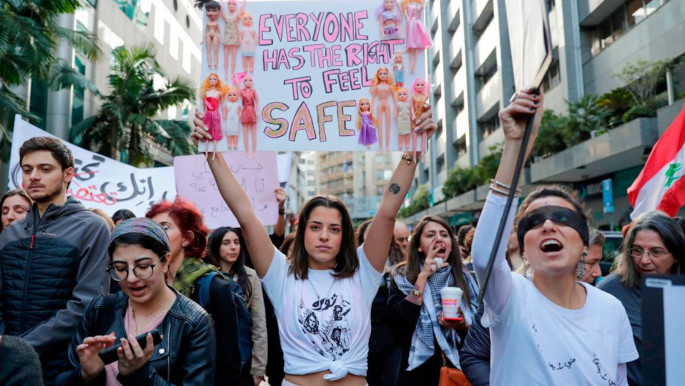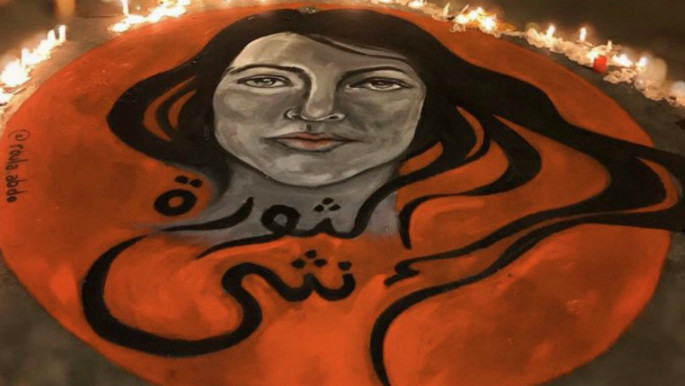Lebanese women press for real legal protection against domestic violence
In the first week of December, dozens of female demonstrators marched through the streets of Beirut to protest against sexual harassment, rape and domestic violence.
Women's groups and young activists performed Chile's viral anti-rape anthem "The rapist is you" in a flash mob.
It was one among several women's marches in Lebanon since the nationwide anti-political establishment demonstrations began on October 17.
On the frontlines, women and girls have made an integral part of the ongoing revolution, advocating for a wide range of issues including combating discriminatory laws and gender-based violence.
On the occasion of the 16 Days of Activism Against Gender-Based Violence campaign which ran from November 25 to December 10, Lebanese women's rights organisation ABAAD launched a song and music video clip titled Not Your Honour sending a powerful message of condemnation of sexual crimes against women and murders in the name of "honour".
 |
|
| Read also: No longer silent: Why Lebanese women took to the streets against sexual violence |
The women's group estimates 55 percent of individuals who make up Lebanon's society mainly link the sexual abuse of women to an attack on "family honour".
"The position of women in Lebanese society has improved in recent years, but the changes are not reflected in the laws," Zhumana Abourus Moufarrez, an adviser to the National Commission for Lebanese Women, recently said in the media.
A woman in Lebanon is governed by religious community rules, depending on which sect she is born into or marries into. The country counts 15 separate personal status laws that are administered by autonomous religious courts with little or no government oversight. All of them are favourable towards men, meaning it is more difficult for women to terminate unhappy or abusive marriages, and to secure financial support from a former spouse, and they have less rights to a child in case of divorce.
Under personal status laws, child marriage is allowed including for girls as young as nine-years-old. Marrying early, girls are more likely to leave school and risk marital rape, domestic violence, poor jobs opportunities, exploitation, and health problems from early childbearing.
 |
The absence of a unified civil personal status law in Lebanon means that all citizens are obliged to abide by different religious laws and courts that all discriminate against women and place them in a subordinate position to men |  |
"The absence of a unified civil personal status law in Lebanon means that all citizens are obliged to abide by different religious laws and courts that all discriminate against women and place them in a subordinate position to men," Zoya Rouhana, director of Lebanese feminist NGO KAFA Violence and Exploitation, said in an interview with UN Women in early December.
Women in the October revolution are fighting to change the country's sectarian power-sharing system they deem unjust to them. The same system protesters blame for corruption and embezzlement.
They stand to gain the most out of political change because they always had a structural and existential problem with the Lebanese political system.
Women in the protests demand better protection against domestic violence which often goes unpunished.
KAFA, which campaigns for legal reform, prepared the first draft law on Protection of Women and other Family Members from Domestic Violence (Law No. 293) which was endorsed by the Lebanese parliament in 2014 after introducing some amendments.
 |
|
| Read also: The revolution is female': Why feminist issues are driving Lebanon's protests |
Welcomed by women's organisations and activists as a key first achievement, the 2014 domestic violence established important protection measures and related policing and court reforms.
The law however falls short. It covers all family members and not women specifically. The final legal text defines domestic violence too narrowly whilst drafts had included definitions of physical, sexual, psychological, and economic violence. It also excludes force sex in marriage, which is not criminalised under other Lebanese law.
"In a previous draft there was an article stating clearly that marital rape is rape, but then it was removed from the final version," Aliaa Awada, ABAAD's Media, Advocacy and Campaigns Advisor, noted.
 |
In a previous draft there was an article stating clearly that marital rape is rape, but then it was removed from the final version |  |
Besides, implementation mechanisms have proved "tricky" since the domestic violence bill is linked to and impacted by personal status laws, dependant on the different confessions in the country, which are "unfair" toward women's rights, the campaign manager complained.
One major shortfall is religious courts are not required by the law to abide by civil court rulings relating to domestic violence, as flagged by Myriam Sfeir, Executive Director at the Arab Institute for Women (AiW), who raised concern about women left stuck in abusive marriages as a result.
"A woman can't sue her violent husband because a lawsuit against him would strictly fall in the remit of the religious personal status court," she pointed out.
On the other hand, Sfeir specified that there have been instances in which courts applying Law No. 293 have issued some "progressive rulings" with judges overriding certain provisions in the bill to rule in women's favour. Nonetheless, judgments from courts largely vary according to the judge.
In addition, public authorities in Lebanon do not provide facilities for women affected by domestic violence, leaving women with little choice other than remaining trapped in the marital home. Only local associations run shelters suited to accommodate and support survivors of gender-based violence.
A related problem consists in the economic obstacles faced by abused as the financial status will have an effect on their ability to leave the household. The more economically deprived, the harder it is for a woman to run away from her husband.
 |
|
| Read also: Scores of Iraqi women victim to online sexual blackmail |
Further to advocacy and lobbying work around Law 293, in 2017 the Ministry of Justice and KAFA drafted a new bill that proposes amendments to improve it, which is currently under discussion by a sub-parliamentary committee. Women's rights organisations are calling on the parliament to close legal loopholes to end all forms of domestic violence.
ABAAD's Senior Programme Manager Raghida Ghamlouch reminded some of the proposed changes to the law: Ensuring the legal definition of rape is comprehensive to include marital rape, and the notion of family extends to the spouse after dissolution of marriage to cover violence committed by ex-husbands; making domestic violence a separate crime, punishable with all its criminal consequences including killing, physical, psychological, sexual, and economic abuse; assigning specialised judges in domestic violence offences in each governorate to receive complaints and follow-up the proceedings; allocating protection orders to women, including protection for children regardless of their age of custody; recognising women's rights to take their children and others who reside with them if they are at risk; enforcing the mechanism for implementing protection decisions between the competent authorities.
Although there is increased reporting of gender-based violence in the family, it is not possible to tell whether the frequency of attacks on women has augmented since there are no reliable statistics about domestic violence in Lebanon.
Females make up the majority of domestic violence victims in Lebanon (56 percent).
"How many times I had to deal in the ER department with women beaten by their husband," a medic with the name of Zeina Moukarzel wrote in a tweet in late November of last year.
Estimates by KAFA indicate that 37 women have died from domestic violence since the start of 2018.
 |
Estimates by KAFA indicate that 37 women have died from domestic violence since the start of 2018 |  |
Every month at least one woman is killed by her spouse or a family member, based on media monitoring conducted by ABAAD.
"Eight women have been killed in Lebanon in less than two months. Legislative reforms and application of the rule of law are urgent priorities to protect women from domestic violence," the UN Deputy Special Coordinator for Lebanon, UN Resident and Humanitarian Coordinator tweeted end of January 2018.
While it marked a major step for legal protection from domestic abuse, Law 293 remains modesty efficient and incomplete so long as most of the religious factions keep strict control over marital court proceedings interfering with civil laws.
Besides advocating for changes to the law, NGOs and women's rights activists are fighting to shift mentalities as more public attention and social awareness is going toward domestic violence in the Lebanese public.
"We don't only push for policy change but also work at a public level to change attitudes and behaviours in the society," Awada emphasised.
ABAAD's campaigner said that much of the work with community members has to do with encouraging more women to speak out and break the cycle of violence, though efforts should be also put in working on behavioural change with young men.
Alessandra Bajec is a freelance journalist currently based in Tunis.
Follow her on Twitter: @AlessandraBajec



